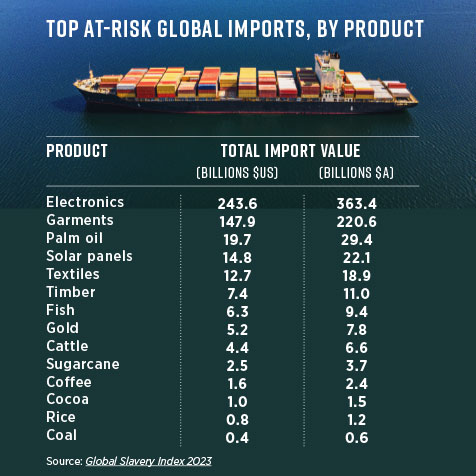Loading component...
At a glance
By Megan Breen
When Dr Katherine Christ tries to put modern slavery into context for people struggling to see how they can be part of the solution, she does it very simply.
“Would you buy a person?” she asks.
A senior lecturer in accounting at the University of South Australia, Christ is an expert in accounting for modern slavery risk, as well as risk management in business operations and supply chains. She regularly engages with multiple stakeholders on the topic of modern slavery.
The global economy relies on corporate sourcing and procurement practices along complex transnational supply chains. Some goods and services that find their way to consumers are sourced in contexts tainted by modern slavery, including forced labour and human trafficking.
Christ believes that unravelling supply chains is the key to addressing the problem.
“Some people give me a horrified look, and I explain that you have got to take your supply chain seriously. If you wouldn’t buy a human being, then let’s make sure that’s not happening in your supply chain,” she says.
The term “modern slavery” is typically applied to human trafficking, slavery, servitude, forced labour, debt bondage, forced marriage, deceptive recruiting for labour services and child labour.
Despite global efforts, including through the adoption of the Sustainable Development Goals (Target 8.7) to end modern slavery among children by 2025, and universally by 2030, the problem is getting worse, says Christ.
The Global Estimates of Modern Slavery report estimates that 49.6 million people were in some form of slavery in 2021. This figure includes an estimated 15,000 people living in conditions of modern slavery in Australia. That is about 10 million more than the previous estimate in 2016.
In Australia, legislation that focuses solely on modern slavery is still relatively new. Since 1 January 2019, more than 3000 organisations based or operating in Australia – with a consolidated revenue of more than A$100 million – have been required to report annually. Their reports are required to discuss the risks of modern slavery practices in their operations and supply chains under Australia’s Modern Slavery Act 2018.
"Companies should be required to take action in the form of effective human rights due diligence. They should be proactively looking for risks of modern slavery in their operations and supply chains and figuring out how they will address those."
While the Act has been welcomed as a critical step towards positive change, more than three years into its operation, there is still room for improvement. Many companies are still failing to report, identify obvious modern slavery risks in their supply chains and take action to address them when identified.
The notion of taking serious action to eradicate modern slavery is gathering momentum across the world, Christ says. A combination of enforcement and penalties, public education and pressure on business from investors is needed.
“There may be businesses that ultimately want to do the right thing, but it’s a steep learning curve. We also have businesses that are disinterested and that are going to completely ignore the Act, because at the moment there are no mechanisms to force them to comply with it,” she says.
CPA Australia’s Modern Slavery Compass
Enforcing the law
A statutory review of the Act was announced on 31 March 2022. The review is now in progress under Professor John Millen AO, supported by the Australian Border Force.
An issues paper for the review was released in November 2022.
The Review of the Modern Slavery Act 2018 Terms of Reference notes that the review is looking at “whether it is necessary or desirable for an independent body, such as an Anti-Slavery Commissioner, to oversee the implementation of the Act and/or the enforcement of the Act”.
Other matters are also under consideration, such as whether additional measures to improve compliance are needed, such as by implementing stiffer civil penalties for businesses that fail to comply.
The proposed amendments reflect the recommendations in a new report, Broken Promises: Two years of corporate reporting under Australia’s Modern Slavery Act.
The report has examined the second year of corporate statements submitted to the Australian Government’s Modern Slavery Register.
It considered statements from 92 companies sourcing from four sectors with known risks of modern slavery – garments, rubber gloves, seafood and fresh produce.
The results show that 66 per cent of the companies reviewed are still failing to comply with the basic reporting requirements mandated by the legislation, with some companies not submitting reports at all.
A further 43 per cent of companies have failed to identify obvious modern slavery risks in their supply chains.
Report co-author Amy Sinclair, senior researcher and regional representative for Australia, New Zealand and the Pacific at the Business & Human Rights Resource Centre, says reporting alone is unlikely to result in the transformative changes to corporate practices that are needed to eliminate modern slavery.
“Companies should be required to take action in the form of effective human rights due diligence. They should be proactively looking for risks of modern slavery in their operations and supply chains and figuring out how they will address those.
“Ideally, there would be an investigative element attached to the commissioner role, rather than it just being simply an awareness‑raising role.
“We’d like to see penalties introduced, so that, at a very minimum, companies are actually reporting in accordance with the Act and producing the disclosures that are required,” Sinclair says.
The ripple effect
Patrick Viljoen CPA, senior manager ESG at CPA Australia, says that a recent joint submission to the Australian Government from CPA Australia and Chartered Accountants Australia and New Zealand emphasises the need to shift from a pure compliance focus.
Instead, we need a more comprehensive understanding of how to engage, on an ongoing basis, with suppliers in the process of eliminating modern slavery and uplifting the supply chains in the process.
“We see the anti-slavery commissioner working in two ways. Firstly, to provide appropriate guidance that will be needed for the level of upskilling and support for preparation and reporting. Secondly, to take action,” Viljoen says.
“We need to help people understand, in practical terms, what modern slavery in their supply chains might look like and what they need to do to address it.”
Looking specifically at the financial services industry, Louise Davidson, CEO of the Australian Council of Superannuation Investors (ACSI), points to risk areas in supply chains. This includes IT procurement, logistics, and property and building services – such as facilities management, utilities, cleaning, waste management and security, and print and promotional goods.
“It can be challenging to have visibility over the IT and other procurement supply chains, so financial services companies need to consider how they can engage with their direct suppliers about their approach and performance in relation to human rights and supply chain management,” Davidson says.
"Australia is an active participant in international trade. We can’t afford to lose competitive advantage because we are not doing the groundwork now, or because other jurisdictions are moving at a faster pace than we are."
Accountants play a leading role in this space, because it involves due diligence and reporting, Christ adds.
“If you look hard enough, you will find modern slavery in your supply chains, and if you are unsure of what steps to take, there are a number of organisations that have developed tools that can help businesses engage with their supply chain,” Christ explains.
“I’m working with a brilliant company in New Zealand called AskYourTeam. They have developed an app-based tool that migrant workers, among others, can use to report the conditions they are working under.
“Their concerns don’t go directly to the person they are working for. They might go to a supermarket chain, for example, who can see where there might be an issue with a particular labour contractor. Once problems have been identified, organisations can act,” says Christ.
CPA Australia's modern slavery statement
Applying investor pressure
In addition to practical tools for business and strengthening the Act, Davidson argues that investors have a significant opportunity to influence and encourage improvements across a wide range of companies and sectors.
Due to Australia’s reliance on imported goods, businesses are particularly at risk of exposure to modern slavery practices, she says. This creates risks for investors and can affect the commercial success, stability and longevity of the companies in which superannuation funds invest.
Davidson emphasises that investors have a responsibility to understand the modern slavery risks across their portfolios.
“They need to engage with investee companies to ensure they are undertaking effective due diligence, mitigating modern slavery risks across their supply chains and responding to any material risks or occurrences of modern slavery that arise,” Davidson says.
In a submission to the current review, the ACSI has called for harmonisation of the Act with international jurisdictions, while ensuring that this does not weaken the standards in the Act.
Victims of modern slavery also need an avenue for redress, Davidson adds.
A global effort

Australia’s efforts to address modern slavery are part of a global conversation.
According to Sinclair, “There is a really important global trajectory under way. Jurisdictions around the world are introducing human rights due diligence processes, laws and regulations, including in Germany, the Netherlands and New Zealand.”
Other countries are planning to ban the importation of goods believed to have been created using forced labour, Sinclair says.
The European Union (EU) has announced plans to ban all goods produced via forced labour. The proposal includes the removal of all products made with forced labour from the markets of the 27-nation bloc, including those made in the EU for domestic consumption, exports and imported goods.
“It is a significant step in increasing the sustainability of supply chains and sets a new standard that other nations may soon follow,” says Sinclair.
Viljoen says that, for Australian businesses, the risks of modern slavery are apparent.
“It will cause issues in the long run for us if we can’t give evidence that our supply chains are clean,” says Viljoen.
“Australia is an active participant in international trade. We can’t afford to lose competitive advantage because we are not doing the groundwork now, or because other jurisdictions are moving at a faster pace than we are.”
The challenge is in educating businesses to take a different approach – one that is not wholly cost based, Viljoen says.
“How do we shift the approach from cost to a more holistic view where it is about safeguarding human lives? If you’ve got workers in a shared service centre based in another jurisdiction, you can’t just say that falls outside of Australia, therefore I don’t need to look at that. Out of sight should not mean out of mind,” Viljoen says.
“Can you, in all good conscience, say that you are safeguarding costs in Australia, but at the expense of a human being in another jurisdiction?”

